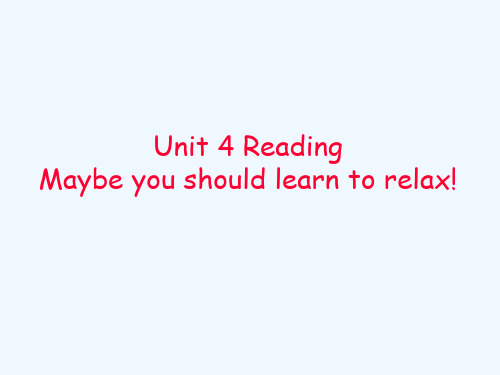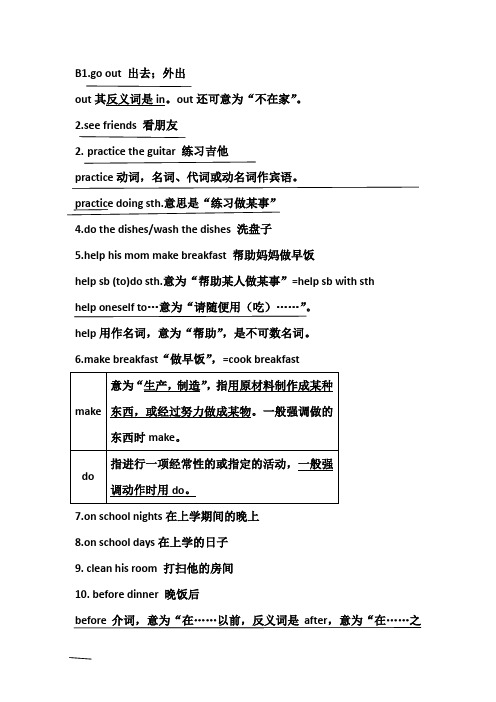unit4 section B
- 格式:pptx
- 大小:6.53 MB
- 文档页数:21




Unit 4Why don’t you talk to your parents?1. Talk about the problems.2. Learn the new language points.1. The differences of“cut up , cut off, cut out”.2. The usage of“compare. . . with. . . ”.现如今父母与青春期孩子们之间的矛盾越来越多, 有的孩子经常对父母发火, 甚至几天不说话。
请以“How to get along well with parents”为题, 阐述父母与孩子间产生矛盾的原因, 以及改善关系的解决措施。
词数: 100词左右。
要点可以包括:1)产生矛盾原因: 父母过分关注分数; . . .2)改善关系的措施: 多交流; . . .How to get along well with parentsNowadays, more and more teenagers can’t get along well with their parents. They often get mad at their parents and some of them even don’t talk with their parents for several days. Why does the relationship between teenagers and parents get so bad? Here are some reasons.First, much attention is paid to teenagers’ grades in exams by parents. They only want to see their kids studying all the time without having a rest or having their own time. Second, both teenagers andparents don’t spend much time in communicating with each other. Parents are always busy with their work. They even don’t understand each other.How to make the relationship better? The followings are the ways to solve this problem. First of all, parents are supposed to spend more time with their f amily. It’s important to take some time to communicate if there are some problems. Besides, both parents and teenagers should find a right way to express their love and talk about their own thoughts to each other. All the problems can be solved by love and understanding.I hope the relationship between parents and teenagers can be good at any time. If both of them would like to spend time and efforts in how to solve the problems between them, they will have a happy and wonderful life together.本课时从一开始即给了学生明确的教学任务, 达到开门见山的效果, 让学生学习的目标性更强, 小组练习的方式也能加强学生对知识点的巩固。

B1.go out 出去;外出out其反义词是in。
out还可意为“不在家”。
2.see friends 看朋友2.practice the guitar 练习吉他practice动词,名词、代词或动名词作宾语。
practice doing sth.意思是“练习做某事”4.do the dishes/wash the dishes 洗盘子5.help his mom make breakfast 帮助妈妈做早饭help sb (to)do sth.意为“帮助某人做某事”=help sb with sthhelp oneself to…意为“请随便用(吃)……”。
help用作名词,意为“帮助”,是不可数名词。
6.make breakfast“做早饭”,=cook breakfast7.on school nights在上学期间的晚上8.on school days在上学的日子9. clean his room 打扫他的房间10. before dinner 晚饭后before介词,意为“在……以前,反义词是after,意为“在……之后11. too many rules太多规则too many +可数名词太多…too much +不可数名词太多…much too +形容词太…12.make your bed 整理床铺make one’s/the bed意为“整理床铺”13. after breakfast 早饭后14. leave sth in +地点留….在某处15.more“更多的”,是many,much的比较级,修饰可数名词复数形式;也可以修饰不可数名词16. be noisy 太闹/ be quiet安静的副词noisily 吵闹地17.have a relax 放松19.20.. How you feel? 你感觉怎么样。
21.tell sb. to do sth 告诉(叫)某人做某事22.. think about 考虑,思考23.. on weekends 在周末24.. feel well 感觉好25. be strict with sb. 对某人严格要求be strict in sth. 对某事要求严格26.27. make rules to help us 制定规则是为了帮助我们28. follow the rules 遵守规则29. keep my hair short 留短发keep +sth./sb.+adj.”意为“让某物/某人保持某种状态keep sb.doing sth.让某人一直做某事30.learn to do sth.”,意为“学习/学会做某事1)learn from sb.意为“向某人学习”。

六年级Unit 4 Section B 导学案Then and Now考点一:表示过去不喜欢什么的句型①I didn’t like + ______词②I didn’t like + ______词did是_______的过去式,后边动词用________。
【边学边练】1.我不喜欢狗。
_____________________________________________2.我不喜欢去跑步。
_____________________________________________考点二:表示过去不能做或不会做的句型I couldn’t + 动词_________.could是_________词,是_________的过去式。
【边学边练】1.以前我不会去骑自行车。
______________________________________________2.在唐朝,人们不能用网络。
______________________________________________考点三:如何描述某人过去和现在的不同情况Before, 主语+________ +其他. Now, 主语+________ +其他.before的意思是_______, 是__________时态的标志词;now的意思是_______, 是_________时态的标志词。
【边学边练】1.以前她留短发,现在她留长发。
________________________________________________2.以前我不会游泳,现在我能游得非常好。
________________________________________________3.以前他不喜欢读书,现在他喜欢读书。
________________________________________________考点四:辨析so和butso和but都是_____词,so的意思是___________,用来表示_________; but的意思是_________,用来表示________关系。
新视野大学英语读写教程(第二版)第一册单词表Unit 4 Section B Body LanguageNew Words<1>statement n. [C] sth. one says or writes 说法,叙述;声明The minister will make a statement tomorrow on the new educational plans. 部长明天将就新的教育计划发表一项声明。
In a statement, the paper admitted that it had given incorrect information. 在一份声明中,这家报纸承认他们提供了不正确的信息。
<2>snap a. done quickly and suddenly 匆忙的,仓促的A snap judgment will not do in that case. 在那种情况下,仓促下判断是不行的。
He always makes snap decisions and never thinks about their consequences. 他总是仓促作出决定,从来不考虑后果。
<3>judgment n. (BrE judgement)1. [C, U] an opinion 看法,意见;判断In his judgment, the red trousers can't match the green shirt. 在他看来,那条红裤子与那件绿衬衣不相配。
It's too soon to make a judgment about what the result will be. 现在就结果做出判断还为时过早。
2. [U] the ability to make wise decisions about what to do and when to do it 判断力;识别力He always shows excellent judgment in his choice of staff. 他在选择员工方面总显示出非凡的判断力。
1. My parents give me a lot of pressure about school.(教材第29页)我父母亲给我许多学习上的压力。
pressure不可数名词,意为“压力”。
Parents often give their children so much pressure.父母经常给他们的孩子太多压力。
How can anyone enjoy the pressure of city life?怎么会有人喜欢都市生活的压力呢?【拓展】与pressure相关的短语:under pressure压カ之下put pressure on sb.向某人施压2. Others are practicing sports so that they can compete and win.(教材第30页)其他人在训练体育,以便他们能比赛获胜。
compete不及物动词,意为“竞争;参加比赛”We car' t compete with them on price.我们在价格上无法与他们竞争。
Five children competed in the race.5个孩子参加赛跑3.However, this doesn't only happen in China.(教材第30页)然而,这不仅仅发生在中国。
however此处作连词,意为“然而;可是”,表示转折关系She felt ill, however, she went to work.她病了,然而她依旧去上班。
辨析: however与but◎however转折意味比but弱,连接的两个分句或有关部分的关系较为松弛,后一部分常起附带说明或村托作用。
however常以插入语形式出现在句子中间,前后用運号隔开,也可置于向首或的末。
例如:He disagreed at first. Later, however, he changed his mind他开始不同意,可是后来他政变了主意。